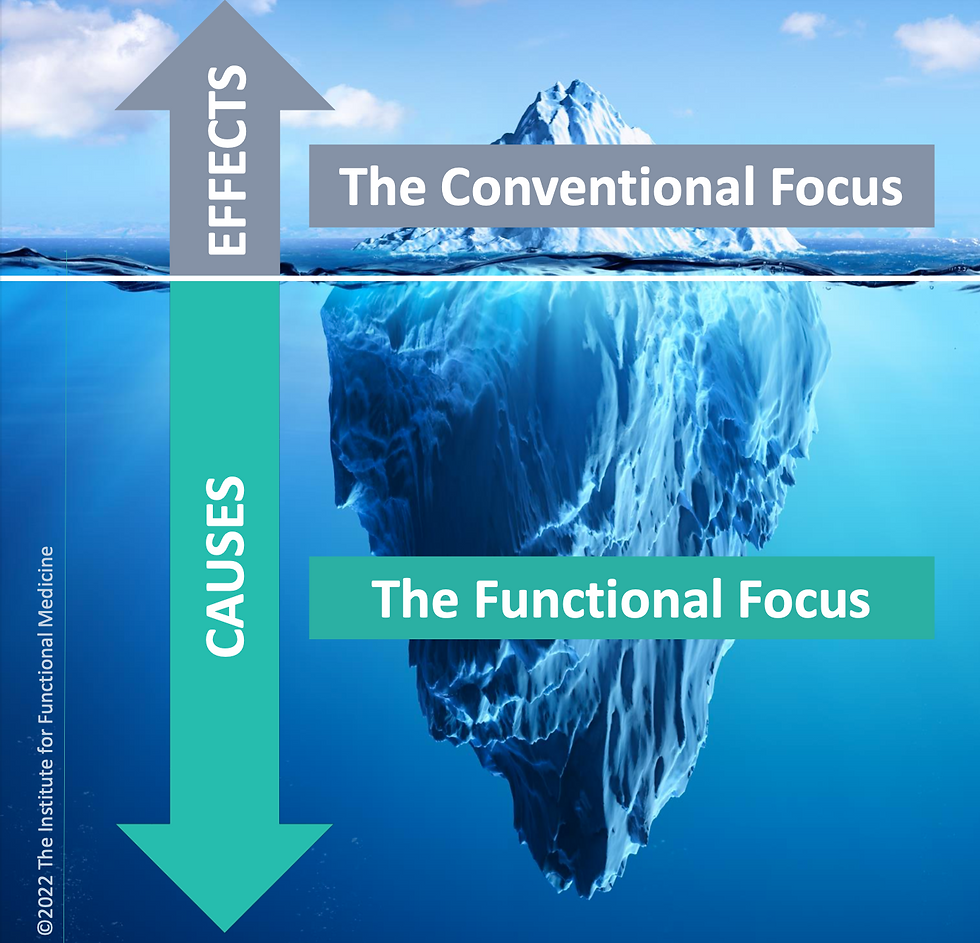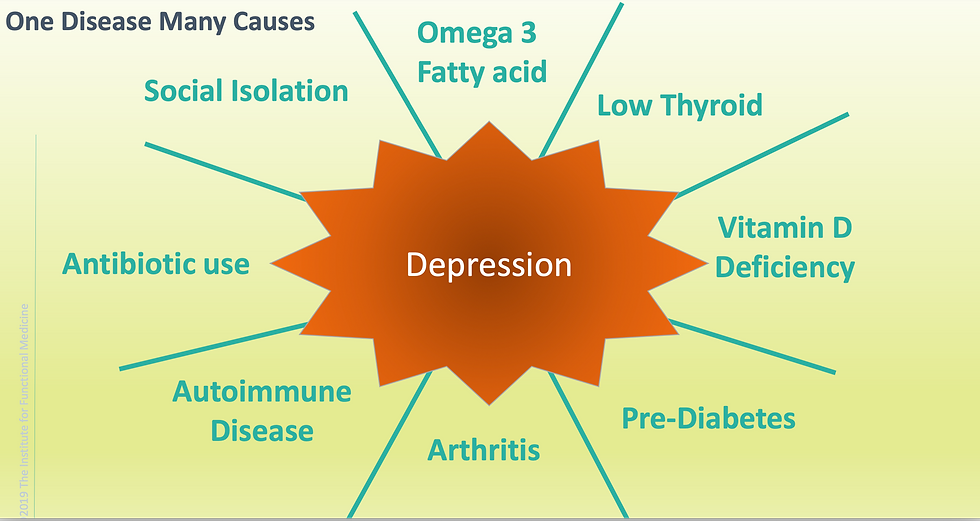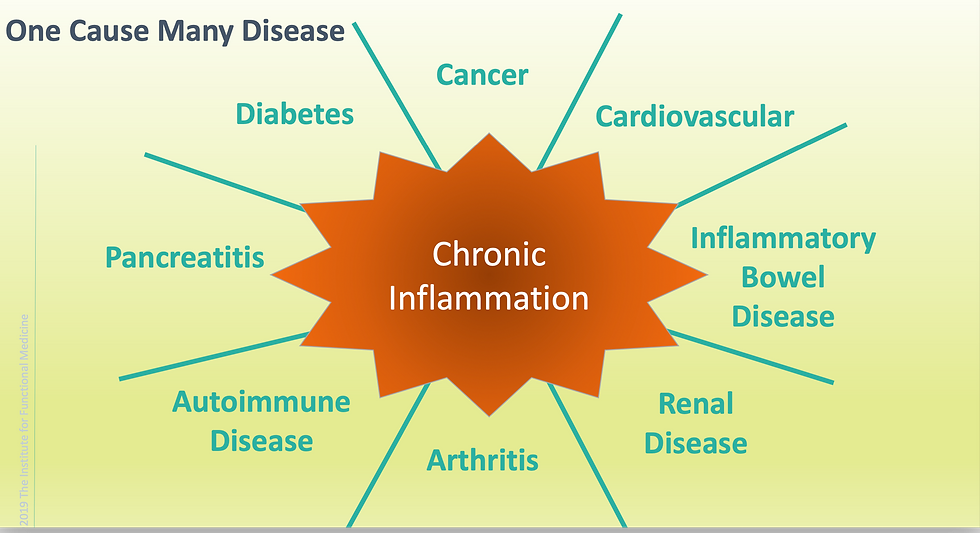Healing with Functional Medicine
- dr. linda

- Feb 13, 2022
- 4 min read
Updated: Apr 9, 2022

Functional Medicine is an individualized, evidence-based approach to health and healing that empowers patients to discover and address the underlying causes of chronic disease and promote optimal wellness. It is an approach to preventing, treating, and reversing complex chronic disease.
The incidence of chronic diseases has skyrocketed in the recent decades. 50 years ago, chronic diseases such as diabetes, heart diseases, Alzheimer’s, and many neurodegenerative diseases were rare. Today, the prevalence of these diseases is rampant in modernized societies, and the suffering they cause is profound. Chronic diseases are now the leading cause of death and disability, and are the leading driver of the nation’s $3.5 trillion in annual health care costs.
Our conventional medical system is brilliant at addressing acute problems: acute infections, physical trauma, heart attacks, joint replacements – and the like. Our society would not be where it is today without the discovery of Penicillin, or the advanced technology of organ transplants, or cardiac surgery. However, when it comes to chronic degenerative diseases – most physicians will agree that modern medicine is limited to provide disease reversal. The training in the standard model of care is to diagnose a disease and match that disease with a corresponding drug. Central to the conventional solution is to use medications to address the symptoms – symptoms which are just the tip of the iceberg.

Scientists used to think that once they figured out the human genome, this knowledge would lead to cures for the diseases which now plague humanity. Instead, what we learned is that humans are not “hardwired” by their genes, but that the genes each individual carries must be “turned on” or “turned off”. The term used is “gene expression”. Individual gene expression is influenced directly by environment, lifestyle, diet, activity, stress, and psycho-social factors. So, the greatest threats to health are actually how we live, work, eat, play, and move. These lifestyle choices and environmental exposures can push us toward (or away) from disease by turning on – or off – certain genes. This scientific insight and principle is at the core of Functional Medicine. Functional Medicine explores how and why illness occurs and helps restore health by addressing the root cause of disease for each individual.
Because chronic disease is driven by food and lifestyle, environment AND genetics, the Functional Medicine approach integrates all these elements in to the context of the person’s unique story. A Functional Medicine practitioner can help you look closely at the interactions between lifestyle and environmental factors which influence long-term health or chronic disease.
There are 6 fundamental principles of Functional Medicine
We are all genetically and biochemically unique.
The body is intelligent and has the capacity for self-regulation, dynamically balancing all your body systems
Everything in the body is connected in a web of relationships. Understanding those relationships allows us to assist healing
The focus is on the person instead of on a disease or condition.
Your body has the ability to heal and prevent disease.
Health is not just the absence of disease, but a state of immense vitality.
The Functional Medicine approach is a therapeutic partnership which helps identify Antecedents (things in the person’s life which may have set the stage for disease)
Triggers (things which were a big push in the direction of disease), and Mediators (things which keep it going).
A broad range of interventions are used to support optimal health including diet, nutrition, movement/exercise, stress management, sleep, rest, phytonutrient & nutritional supplementation if needed and various other restorative therapies. These interventions are all tailored to the individual to address the Antecedents, Triggers, & Mediators of health conditions.
The Institute of Functional Medicine (IFM) uses a biological systems based model for looking at imbalances which may be contributing to an individual’s health. We want all our different biologic systems to be functioning optimally and in balance. This gives the body the best chance of correcting it’s course and healing itself as it was designed to do.
IFM considers the function of 7 interconnected biologic systems:
Assimilation: how we digest and absorb nutrients. How our microbiome interacts with us.
Defense & Repair: The immune system. The presence of inflammation. Healing.
Energy: How our cells make energy for all bodily functions
Biotransformation/elimination: Identifying toxins and helping detoxification
Transport: The flow of fluids in our body such as blood and lymph
Communication: via neurotransmitters, hormones, immune cellular messengers
Structural Integrity: from the muscle, bones, and joints to the cellular membranes.
When we use this model to look at health conditions, we come to understand that one condition can have many contributing causes. Likewise, one imbalance can be at the root of many possible conditions.


The Functional Medicine approach can be boiled down to 2 simple principles:
Removing the things that are harming or pushing you toward disease
Providing the good things that help (and are missing)
Functional medicine is NOT a test or treatment or supplement. It is a NEW WAY OF THINKING.
Functional Medicine is a paradigm shift in health care. It is a shift from Disease care to Health care. The Focus is on
finding the causes that lead to the clinical imbalances
learning how to create balance to restore optimal health.
Your body is designed to heal itself. A therapeutic partnership with a Functional Medicine practitioner can help. Together, you can discover the imbalances which block health and harness the innate powers of healing designed into your biology.
CDC. National Center for Chronic Disease Prevention and Health Promotion. https://www.cdc.gov/chronicdisease/resources/infographic/chronic-diseases.htm.
Tavassoly I, Goldfarb J, Iyengar R. Systems biology primer: the basic methods and approaches. Essays Biochem. 2018 Oct 26;62(4):487-500. doi: 10.1042/EBC20180003.
Moon Y. Microbiome-Linked Crosstalk in the Gastrointestinal Exposome towards Host Health and Disease. Pediatr Gastroenterol Hepatol Nutr. 2016 Dec;19(4):221-228. doi: 10.5223/pghn.2016.19.4.221.
Beidelschies M, Alejandro-Rodriguez M, Ji X et al. Association of the functional medicine model of care with patient-reported health-related quality-of-life outcomes. JAMA Netw Open. 2019;2(10):e1914017. doi:10.1001/jamanetworkopen.2019.1401710.
Droz N, Hanaway P, Hyman M, et al. The impact of functional medicine on patient-reported outcomes in inflammatory arthritis: a retrospective study. PLoS One. 2020;15(10):e0240416. doi:10.1371/journal/pone.024041611.
Rosenberg A, Ngandu T, Rusanen M, et al. Multidomain lifestyle intervention benefits a large elderly population at risk for cognitive decline and dementia regardless of baseline characteristics: the FINGER trial. Alzheimers Dement. 2018;14(3):263-270. doi:10.1016/j.jalz.2017.09.0066
Institute of Functional Medicine: www.IFM.org

Comments